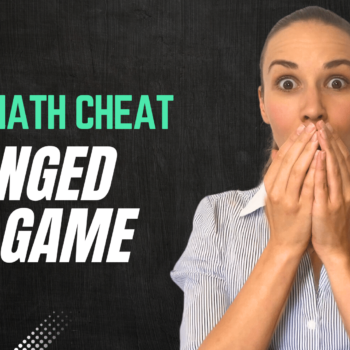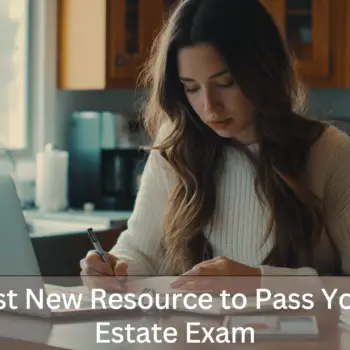Imagine being a licensed real estate agent or broker who can help people find their dream homes and earn a handsome commission. Sounds great, right?
But before you can enjoy the perks of being a real estate professional, you must pass your state’s real estate licensing exam. This exam is not easy. It covers a lot of topics and requires a lot of preparation.
That’s why I’m here to help you. Here at Real Estate License Wizard, we know exactly what it takes to ace the exam, and I want to share our secrets with you.
In this article, you’ll learn everything you need about the real estate licensing exam, including its format, content, and secrets. You’ll also get some proven tips and tricks on how to study for it, pass it, and prepare for the exam day. Following this guide will boost your confidence and increase your chances of success. Let’s get started.
What Is the Real Estate Exam?
The real estate exam is a state-specific test that evaluates your ability to perform the duties of a real estate professional. It consists of two parts: a national section covering general real estate principles and practices and a state section covering your state’s laws and regulations. The exam is usually administered by a third-party testing service at a designated location.
The exam format and difficulty vary by state, but you can expect to answer 100-150 multiple-choice questions within 90 minutes to four hours.
You must score at least 70% on both sections to pass most states’ real estate exams. Some states may have higher or lower passing scores, and you can check the specific requirements by contacting your state’s real estate commission, visiting their website, or checking out our state license requirements page.
Real Estate Exam Curriculum
Questions on the real estate exam cover a wide range of topics related to real estate, such as property ownership, contracts, ethics, and more. Really the best way to break things down is by overarching topic. We’ve established a unique system of organizing these topics which you can see below:
- Property Ownership
- Land Use Controls and Regulations
- Valuation and Market Analysis
- Property Disclosures
- General Principles of Agency
- Financing
- Leasing and Property Management
- Contracts
- Transfer of Title
- Fair Housing
- Practice of Real Estate
- Real Estate Calculations
Each one of those topics are essential to fully understand come exam time.
How to Study for the Real Estate Exam
Studying for the real estate exam requires a combination of methods, such as taking prep courses, reviewing course materials, using exam training tools, and practicing with sample questions and tests.
Familiarize Yourself with the Exam Format
It’s essential to know what to expect on exam day, so take some time to familiarize yourself with the format of the real estate license exam. Review the exam instructions, including the number of questions, time limit, and passing score required. Knowing the exam format beforehand can help you manage your time better and reduce anxiety on the day of the exam.
Prepare with Real Estate Practice Exams
Practice makes perfect, and the best way to prepare for the real estate exam is to use practice exams. Treat them like the real deal by turning off distractions, timing yourself, and reviewing the questions you got wrong.
Check out our free practice real estate exam, and let us know what you think!
Learn Your Real Estate Vocabulary
Vocabulary is an essential part of the real estate exam because it tests your understanding of the terminology and concepts that are fundamental to the industry. With a solid grasp of real estate vocabulary, it can be easier to comprehend complex legal documents, contracts, and agreements, which are crucial to conducting successful real estate transactions.
Additionally, real estate professionals must communicate effectively with clients, colleagues, and industry professionals, using the appropriate terminology and jargon.
As a result, the real estate exam places a significant emphasis on vocabulary to ensure that aspiring real estate professionals have a strong foundation in the terminology and concepts necessary to excel in the field.
Learn Your Real Estate Acronyms and Abbreviations
You can use acronyms and abbreviations to remember critical information quickly. For example, to remember the different types of deeds, you can use the acronym “QCD,” which stands for Quitclaim Deed.
Come Up With Real-life Scenarios That Relate to Concepts
Try to relate concepts to real-life scenarios to help you remember and apply information on the exam. For example, you can connect the concept of “comparables” to buying a car. Just as you compare the features and prices of different cars before making a purchase, you also compare the features and prices of various properties when buying real estate.
Try remembering when someone in your family sold their house, and associate that with concepts you need to know for the exam. Try to visualize real-life scenarios; it might sound silly, but it works. This simple yet often forgotten study method can be applied to the real estate license exam.
Master Real Estate Math
Real estate math is a significant part of every state’s real estate exam. Don’t be intimidated by it. Real estate math is by no means difficult, but practice is needed to be able to apply the concepts correctly.
Practice with our real estate math guide and practice exam to turn it into a strength.
Create a Real Estate Cheat Sheet
Creating a cheat sheet can be a valuable strategy to solidify your understanding of the key concepts and information you struggle with. It can also help you recall important information quickly during the exam. Creating a cheat sheet itself can also be a helpful study tool, as it requires you to condense the material into concise and manageable sections.
Identifying and organizing your weaknesses into specific categories can help you target your studying more effectively. For example, you might create separate sections for real estate laws, math formulas, vocabulary terms, and critical concepts. By focusing on the areas where you need the most improvement, you can optimize your study time and improve your chances of success on the exam.
Once you’ve created your cheat sheet, review it regularly and try to commit the information to memory. Consider making flashcards based on the information in your cheat sheet, as this can help you drill down on specific terms and concepts.
Seek Help from Real Estate Professionals
Local agents and brokers can provide valuable advice on state-specific rules and regulations. Don’t be afraid to ask for help, as it can also lead to valuable connections.
Binge Real Estate Exam Prep Videos
Instead of binge-watching funny cat videos, why not spend your free time watching real estate exam prep videos?
In addition to practicing with practice exams and studying real estate terms and math, watching exam prep videos can be a great way to prepare for the real estate exam. These videos cover a range of topics likely to appear on the exam and can help you understand complex concepts more engagingly and visually.
Watching exam prep videos can also be a great way to break up your study routine and keep things interesting. You can watch them while taking a break from practice exams or commuting to work, for example.
Just be sure to balance your video watching with other study methods, as watching videos alone may not be enough to prepare you for the exam fully. But when used with different study methods, real estate exam prep videos can be a valuable tool in your exam preparation arsenal.
Enroll in a Real Estate Exam Prep Course
For unlimited access to practice exams, expert advice, and more, enroll in a real estate exam prep course. Our comprehensive real estate exam prep course has videos covering everything about the exam and authentic practice exams. It’s refined to focus on what you need to pass the exam.
Passing the Real Estate Exam
Now that we’ve covered what to study and how to study, we have to put what we know to the test. After all, learning how to study for the real estate exam is one thing; passing is another. You can do all the suggestions we went over but still not succeed.
To increase your chances of success, developing a study plan that includes a combination of strategies is essential. Not to mention it’s necessary to understand the thought process behind taking the exam itself, managing your time during the test, reading the questions carefully, eliminating wrong answers, guessing intelligently, and more.
Start With a Study Plan
If you take all the study methods we discussed and map out a plan that works for you, that’s a ticket to success. Remember, what works for someone else might not work for you, and that’s okay! Everyone learns differently. For example, real estate prep videos might be the easiest way for you to digest new information rather than flashcards or cheatsheets; whatever the case may be, develop a plan that fits you and stick to it.
Create a Plan for the Test Itself
When you get the exam, what’s the first thing you will do? Are you going to skip questions? Do you guess on questions you don’t know or come back to questions later? These are all questions you need to ask yourself now before exam day. Without a proper plan, you can get overwhelmed and waste valuable time during the exam. Creating a plan for the test itself will help you stay focused and calm during the exam, allowing you to perform at your best.
Skipping Questions
Decide whether you want to skip questions or come back to them later. Some people find it helpful to skip questions they don’t know the answer to immediately and move on to questions they’re more confident about. This strategy helps them maximize the number of questions they answer correctly, and they can always return to the skipped questions later. Other people prefer to answer questions in order and complete them so they don’t get bogged down in any one question for too long. Both strategies can be effective, so choose the one that works best for you.
Guessing on Questions
It’s also essential to have a strategy for guessing on the exam. While it’s always best to answer the question correctly, sometimes you’ll encounter a question you don’t know the answer to. In these cases, it’s essential to guess intelligently. Start by eliminating the answers you know are incorrect, and then choose the best answer from the remaining options. You can use context clues, elimination, or other strategies to make an educated guess.
Trust Your Gut or Not?
One of the most debated topics regarding test-taking is whether or not to trust your gut or change answers. When it comes to the real estate exam, there’s no easy answer.
Some test-takers swear by their initial instincts and believe that changing an answer will only lead to more mistakes. Others believe changing an answer can improve their score if they’ve made a mistake. The truth is both strategies can be effective in different situations. If you’re confident in your initial answer, it’s best to stick with it. However, if you feel that your answer is incorrect, it might be worth taking the time to review the question and make a change.
Ultimately, it’s essential to trust yourself and make the best decision for each question based on your knowledge and instincts.
Mental and Physical Prep For the Real Estate Exam
You might be wondering, what else can be done? And the answer is a lot, actually. You might’ve heard horror stories of exam takers being late to their test or showing up and realizing they have the wrong paperwork, no matter the case; a certain amount of things can be done to reduce the risk of this happening.
Take Care of Logistics Before the Exam
To get your affairs in order, you need to know the exam location, date, and time, so you can plan to arrive early. It’s also a good idea to ensure your car has a full gas tank and that any necessary maintenance is done beforehand.
Additionally, bring all the required documents, including your real estate exam registration documents, a calculator (if allowed), and proper identification. Each state has its requirements, so reviewing them before exam day is vital to avoid surprises.
Study Breaks – Don’t Burnout!
Taking study breaks is essential to preparing for the real estate exam. Regular breaks can prevent burnout, increase productivity, and improve information retention. Studies show that taking breaks keeps the brain fresh, prevents it from becoming overwhelmed, and helps you stay motivated and focused on your studying goals.
The duration and frequency of breaks may vary depending on individual needs and preferences. During breaks, doing something that relaxes your mind and body, such as walking, stretching, or meditating, is essential. By incorporating regular breaks into your study routine, you can stay motivated and focused, ultimately improving your chances of passing the exam.
Stay Motivated – You Can Do THIS!
Staying motivated throughout studying for the real estate exam is crucial for success. One way to stay motivated is to set specific goals for yourself.
These goals should be challenging yet achievable, and you should have a plan for achieving them. Breaking down your goals into smaller, manageable tasks can make them seem less overwhelming and help keep you motivated.
Another way to stay motivated is to track your progress. Record your study hours, practice test scores, and areas you need to improve. Seeing progress can be a powerful motivator and can help you stay focused on the end goal of passing the real estate exam.
Sleep
Getting a good night’s sleep before the exam is also crucial. It’s been scientifically proven that a good night’s sleep can lead to higher test scores. So, instead of partying or binge-watching a TV show, dedicate the last night before the exam to some last-minute studying, followed by a relaxing and restful sleep. Aim to get 8-9 hours of sleep before the exam day for optimal results.
Don’t Skip Breakfast
Having a nutritious breakfast before the exam is also paramount. Skipping breakfast can make you feel hungry, leading to distraction and a lack of focus. Even if you don’t feel like cooking, eating something before the exam is crucial.
Eating breakfast will provide you with the necessary energy to perform your best. By taking care of these small but crucial details, you can arrive at the exam center feeling prepared and confident, ready to tackle the real estate exam.
Recap + Believe in Yourself
In conclusion, passing the real estate exam requires a combination of strategies, including managing your time, reading questions carefully, eliminating wrong answers, and guessing intelligently. You should also have a solid understanding of specific content on the exam, such as math formulas, legal terms, and contract clauses, and use tricks to remember and apply this information effectively.
Planning for the test, getting a good night’s sleep, and having an excellent breakfast are also essential steps to prepare for exam day. Additionally, taking study breaks and staying motivated throughout the process can increase productivity and improve information retention.
One last thing we didn’t talk about is confidence. If you’re reading or watching this, you’re already on the right track to passing the real estate exam. Confidence can majorly affect your success, so believe in yourself and your abilities. Remember, if you put in the time and effort to prepare, you can do anything. Seriously, trust in yourself.
To further boost your confidence and increase your chances of passing the exam, take advantage of the resources available to you. Our free practice exam is a great place to start. By taking the practice exam, you can access your knowledge and identify areas you need to improve. With dedication, hard work, and the right strategies, you can pass the real estate exam and begin your journey as a licensed real estate agent. So why wait? Take our free practice exam today and start preparing for exam day!







